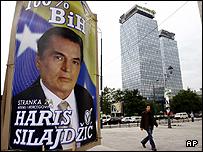
Haris Silajdzic leads the Party for Bosnia-Hercegovina
|
Bosnia-Hercegovina will go to the polls on Sunday for the fifth time since the signing of the Dayton peace agreement in 1995.
Voters will elect representatives to the country's Muslim-Croat Federation, Republika Srpska, federal and local assemblies, as well as the president and vice-president of the Serb entity, Republika Srpska.
The last poll was held in 2002 and dominated by nationalist parties.
Who is voting?
According to estimates from 1999, Bosnia-Hercegovina has a population of 3,482,495 (before the war in 1991 it was 4,365,000). There are three main ethnic groups - Bosnian Muslims (Bosniaks), Croats and Serbs.
The Central Election Commission says the number of voters has increased by about 15% - an extra 394,745 - compared with 2,736,886 in the last elections in 2002. Of the new voters 366,468 are eligible to vote in the Muslim-Croat Federation and 28,259 in Republika Srpska. The Election Commission has not explained the significant increase and its concentration in the Federation.
How does it work?
The overall Parliamentary Assembly of Bosnia-Hercegovina has two chambers: the House of Peoples and the House of Representatives.
The House of Peoples comprises 15 delegates, two-thirds from the Federation and one-third from Republika Srpska. The delegates will be selected by members of the corresponding assemblies.
The House of Representatives has 42 members, two-thirds elected from the Federation and one-third from Republika Srpska. Members of the House of Representatives will be directly elected from the Federation and Republika Srpska (referred to as the "entities").
The three members of the Presidency of Bosnia-Hercegovina will be directly elected in each entity. Republika Srpska voters elect the Serb member, and Federation voters choose the Muslim and Croat representatives.
The People's Assembly of Republika Srpska has 83 members and they will be directly elected by voters registered in Republika Srpska.
The House of Representatives of the Federation has 98 members and they will be directly elected by voters registered in the Federation.
What are the issues?
The main election issue is the failure to agree on constitutional amendments in April 2006 that would have transferred more power from the entities to the overall state. The key Serb parties had reluctantly agreed to these moves, but the reform was blocked by new Muslim and Croat parties that advocated the immediate abolition of Republika Srpska. Some Serb politicians now moot an independence referendum.
The Election Commission has threatened action against those calling for the abolition of Republika Srpska or an independence referendum.
Serb parties are united in opposition to calls for the dissolution of their republic, but the Muslim side has been divided by the decision of Haris Silajdzic, a charismatic Muslim leader, to return to frontline politics. The most formidable opponent of the constitutional reforms, he has won over the head of the Islamic Community and some powerful Muslim businessmen to his Party for Bosnia-Hercegovina (SBiH), which is challenging the Party of Democratic Action (SDA) for Muslim votes.
The main Croat party, the Croat Democratic Union (HDZ) split in April 2006, with the anti-reform HDZ 1990 securing the support of the Catholic Church and the governing party in Croatia itself. HDZ 1990 was Mr Silajdzic's main ally in his successful campaign against the reforms.
Who is standing?
A total of 36 parties, eight coalitions and 12 independent candidates are standing in the elections, and the main contenders are:
The Party of Democratic Action (SDA - leader Sulejman Tihic): Hitherto the main Muslim party, in which Bakir Izetbegovic, son of founder Alija Izetbegovic, is widely seen as the most influential leader.
The Party for Bosnia-Hercegovina (SBiH - leader Haris Silajdzic): Founded in 1996 as a breakaway from the SDA by Haris Silajdzic to oppose the constitutional reforms. The main Muslim daily newspaper Dnevni avaz backs it.
The Social Democratic Party (SDP - leader Zlatko Lagumdzija): The successor to the Communist Party, the SDP counts on moderate Muslim voters and Serbs and Croats living in mainly Muslim areas. The influential Sarajevo-based daily newspaper Oslobodjenje backs it.
The Croat Democratic Union (HDZ - leader Dragan Covic): Hitherto the main Croat party.
The Croat Democratic Union 1990 (HDZ 1990 - leader Bozo Ljubic): Founded in April 2006 by ex-HDZ members to oppose the constitutional reforms. Backed by the Catholic Church and the governing party in Croatia.
The Alliance of Independent Social Democrats (SNSD - leader Bosnian Serb Prime Minister Milorad Dodik): Once seen as the most moderate Serb party, it now says the Serb Republic might hold an independence referendum. The major Bosnian Serb daily Nezavisne novine supports Dodik.
The Serb Democratic Party (SDS - leader Dragan Cavic): The main Serb party hitherto, it labours under its association with founder and war-crimes indictee Radovan Karadzic.
The Party of Democratic Progress (PDP - leader Bosnian Foreign Minister Mladen Ivanic): Reliant on urban voters, the PDP is likely to remain a junior partner in any coalition in Republika Srpska.
BBC Monitoring selects and translates news from radio, television, press, news agencies and the internet from 150 countries in more than 70 languages. It is based in Caversham, UK, and has several bureaux abroad.


~RS~q~RS~~RS~z~RS~42~RS~)